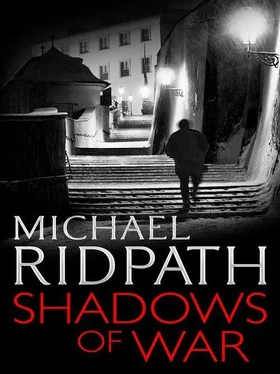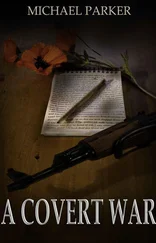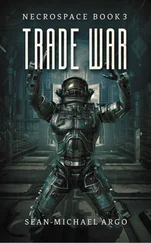‘Can you show it to your friends? I’ll wait for a response.’
Theo examined the letter again, nodded, folded it, and put it in his breast pocket. ‘I will do as you ask.’
‘Thank you,’ said Millie, finishing her coffee. ‘We’ll be here. We’re staying at the Kurhaus.’
‘I’ll walk part of the way back with you,’ Theo said.
Millie couldn’t help grinning.
Constance noticed. ‘Look here. I think I’ll just have a root around the harbour for a bit, and then take a stroll through the town. I’ll meet you back at the hotel later, Millie.’
‘Right oh,’ said Millie, thinking that Constance wasn’t so stupid after all.
They left the café and Millie took Theo’s arm. He led her along the harbour wall past the long line of boats. The wind had picked up and Millie pulled herself close against Theo for protection. There was a strong smell of fish, coming from the boats themselves and the nets neatly stacked on the quay. Three or four hardy seagulls battled against the breeze, searching out scraps of fish that they might have missed from the day before, their cries snatched from their beaks by the wind.
‘It’s nice to see you again, Millie,’ Theo said. ‘I’ve missed you.’
‘And me you,’ said Millie. ‘Thank you for your letters. It’s horrid to think we are at war now.’
‘Very horrid,’ said Theo.
‘Are you staying in The Hague?’
‘I was last night. But now I will have to fly back to Berlin to discuss this letter. I should be back soon, perhaps the day after tomorrow.’
‘That’s a shame. I was rather hoping you would be able to stay here while we waited. Like we did in Zurich.’
‘I wish I could,’ said Theo. They were coming to the end of the wall by the small lighthouse. They looked back along the narrow strip of sand, grey rather than yellow in the gloomy November light. The grandly decorated Kurhaus with its distinctive dome preened itself behind the beach, and a little beyond that, the pier jabbed out into the sea.
‘Last time I was here they still had bathing machines,’ Millie said. ‘Do you remember those?’
‘You came here as a girl?’
‘For a couple of summers. It was fun. I loved the seaside, and it brought back memories for Mother, who used to come here herself when she was little.’
‘Now beaches are for fighting on,’ Theo said.
‘They are putting up all sorts of gruesome things on ours,’ Millie said. ‘Oh, I probably shouldn’t tell you that. Since you are a spy.’
‘I will send a message to Berlin by carrier seagull immediately. I just need to catch one.’
‘I think you will find the seagulls here are on our side,’ said Millie. ‘They have flown in from Suffolk.’
One of the birds a few yards from them squawked, wheeled and was swept back towards the town.
‘Sounded Dutch to me,’ said Theo.
Millie was tall, but she looked up at Theo. His cheeks were red in the wind, his dark hair flopping over his forehead. She had a strong desire to kiss him. He bent towards her.
And she turned away.
Theo stood back abruptly, stiffening. It was as if a wave of awkwardness had burst over them and the sea wall.
A wave Millie was determined to brush off. She turned back to Theo and reached for his hand. ‘I’m sorry,’ she said, squeezing it. ‘I just think I shouldn’t kiss a German spy.’
Theo grinned, taking the opportunity to lighten the mood. ‘I suppose it’s not very patriotic. But we are allowed to enjoy each other’s company, aren’t we?’
‘Oh, yes,’ said Millie. ‘We are.’ And she left her hand in his.
Amsterdam
Spuistraat 210 turned out to be a stylish modern building called the ‘Bungehuis’ in the centre of Amsterdam. Bedaux International occupied the second floor. Conrad approached the young woman behind the desk in the reception area and asked her if she spoke English.
‘Yes, certainly I do. How can I help you, sir?’
‘My name is de Lancey. I work for a merchant bank in London, Gurney Kroheim, you may have heard of us?’
The woman shook her head.
‘Ah, well. I am visiting the Netherlands on business. A colleague asked if I would drop by and collect some information on your company. Do you have some brochures, by any chance?’
The woman smiled. ‘One moment, sir, take a seat.’
Conrad sat in the waiting area and listened as the receptionist spoke rapid Dutch on the phone to someone. Fortunately there was a pile of brochures on the table in English, Dutch, German and French. Conrad grabbed one and began to scan it. It extolled the ‘Bedaux System’, which seemed to be a scheme that improved factory productivity. There were photographs of cheerful workers in Holland, France and Britain. There were graphs. And there was a photograph of a short burly man with shiny dark hair brushed back and large jug ears, smiling as he shook the hand of a French company chairman.
Charles Bedaux.
‘Mr de Lancey?’
Conrad looked up to see a slim woman of about forty wearing a dark suit.
‘My name is Mrs ter Hart. I am the General Manager of this office. Can I help you?’ Her English was good; her accent, though slight, sounded to Conrad’s acute ear more Eastern European than Dutch.
Conrad rose and shook the woman’s hand. ‘Ah, yes. I work for Gurney Kroheim in London,’ he began, hoping that Bedaux International was not an existing client of his father’s bank.
‘I know it,’ she said.
‘Good, good. I was in Amsterdam seeing a couple of the bank’s clients, and one of my colleagues asked me to pick up information on Bedaux International.’ Conrad held up the brochure. ‘This looks very useful. Do you mind if I keep it?’
‘Not at all,’ said Mrs ter Hart. ‘Do you know why your colleague is interested in our firm?’
‘Not absolutely sure, no,’ said Conrad. ‘I think he’s interested in the Bedaux System.’
‘Yes?’
‘Yes.’
Mrs ter Hart was beginning to look suspicious. Keep it vague, Conrad told himself.
‘The system is usually implemented in factories not banks,’ said Mrs ter Hart. ‘It can often double productivity.’
‘So I have heard,’ said Conrad. ‘I think my colleague wants to see whether it can be applied to some of the more repetitive tasks that go on in a bank. He would like to discuss it with Mr Bedaux directly. Where is he? Is he here?’
‘That would be a novel application of the system,’ said Mrs ter Hart sternly. Then she seemed to consider the proposition. ‘Mr Bedaux is always very busy, but he likes novel ideas. He visits Amsterdam fairly frequently, and London occasionally. But he is based in Paris, as I am sure you know.’
‘Do you have his address there?’
The Dutchwoman picked up the French brochure and handed it to Conrad. ‘It’s on the back page.’
‘Thank you, Mrs ter Hart,’ said Conrad, deciding to make his escape before he put his foot in it.
‘Not at all,’ said the woman. ‘By the way, what is your colleague’s name?’
Conrad searched for the name of an employee at Gurney Kroheim, but all he could come up with was a couple of the directors, friends of his father. ‘Alston,’ he said. ‘Henry Alston.’
Mrs ter Hart nodded. She produced a card.
Conrad took it and smiled. ‘I’m afraid I have given all mine away this trip. Thank you so much.’ He left, clutching the brochures.
He found a café by a canal around the corner from Bedaux’s office. The canal was called ‘Singel’, just like the one in Leiden. No wonder Theo knew of its existence in Amsterdam if it was so close to the mysterious Bedaux International.
Conrad had three hours until his flight left back to London. He had found out a little about Charles Bedaux. The American ran a very successful international management-consulting business with offices all over Europe. He was based in Paris. And he had big sticking-out ears.
Читать дальше












